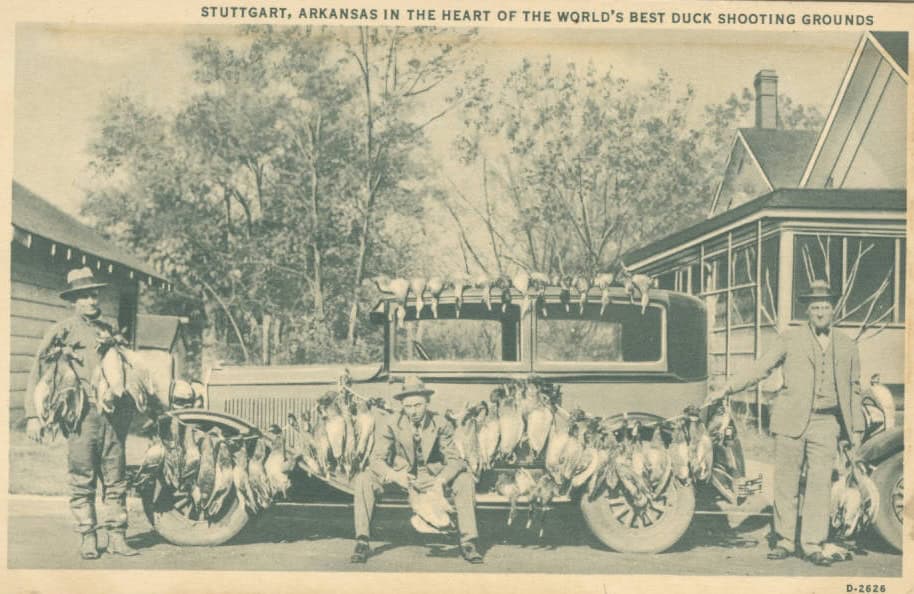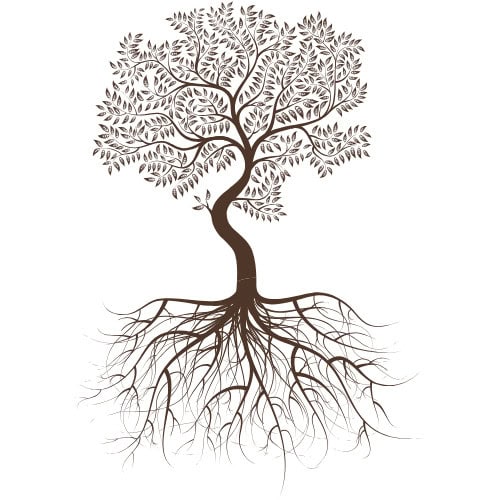Hunting is an integral part of Arkansas’s identity. It’s part of our economy, our culture, our natural heritage. The state’s diverse geography provides habitat for an array of wildlife. From deer hunting in the southwest pine woods, turkey hunting in the Ozarks, to duck hunting in the Delta, Arkansas’s game populations represent a true success story.
Editor’s Note: This three-part series explores the role of hunting in Arkansas. For a complete list of Arkansas Hunting Seasons and Hunting Guide, visit the Arkansas Game & Fish Commission website.
Written by Dr. Jack Boles


Left: “An array of camouflaged hunting gear inside Fletcher Lord Jr.’s Temple of Doom Duck Clubhouse in DeWitt, Arkansas.” Right: “A slew of decoys at the ready at the S Club, a private duck hunters’ club in Arkansas County, Arkansas.” Photographs by Carol M. Highsmith, November 2020. Images courtesy of the Library of Congress.
Hunting supports jobs in recreation, tourism, and retail.
The state’s GDP and job market see major contributions from hunting-related activities, bringing in approximately $3 billion every year. Hunting benefits local businesses like taxidermists, gear shops, and lodges. Revenue from licenses, equipment, and travel supports state and local programs, including wildlife initiatives at the Arkansas Game and Fish Commission (AGFC). The future of wildlife conservation depends on the revenue generated from hunting.
The Natural State has not always been a wildlife wonderland.
Overhunting, especially throughout the Great Depression, left many wildlife species nothing more than myth. Deer hunters would hope to simply see a deer. Now deer and turkey are plentiful. Elk roam where they have not been since the 1830s. Government agencies, as well as organizations like Rocky Mountain Elk Foundation, Ducks Unlimited, and the Wild Turkey Federation work hard to manage wildlife populations today. Commitment to responsible hunting practices and conservation efforts are hallmarks of Arkansas’s hunting culture, and many Arkansans play an active role with these organizations to protect and maintain wildlife habitats and honor their outdoor heritage.

“Stuttgart, Arkansas in the heart of the world’s best duck shooting grounds.” (Undated) Image courtesy of the University of Arkansas at Little Rock Center for Arkansas History and Culture. [Postcard collection, circa 1900-1980 (UALR.PH.0105)]
Hunting has always been an important wildlife management tool.
Population control is necessary to prevent starvation and disease and hunting provides the ability to manage populations while providing protein for Arkansas families. Many Arkansas families fill their freezer with venison every deer season. With Arkansas ranked worst in the nation in food insecurity, hunting is a reliable source for much-needed protein, even for those who don’t hunt.
A nonprofit called Hunters Feeding the Hungry partnered with the AGFC to help hunters share their harvest. With statewide support from deer processors, food pantries, and schools, the group has distributed more than 1.5 million pounds of venison to hungry students and families.
Hunting in Arkansas is more than a recreation or sport; for many it is a way of life.
Schools and educational programs reflect Arkansas’s hunting culture. Some schools host competitive archery clubs and have implemented an official fall break because few students show up to school on the first day of deer season. Arkansas 4-H is a national leader in 4-H Shooting Sports program, and the 4-H Wildlife Habitat Improvement Program teaches young people the skills and knowledge needed to support and improve wildlife habitat in their home state. Educational curriculums such as Project Learning Tree introduce children to the natural world and to wildlife habitat conservation. Hunting is often a rite of passage in rural Arkansas, and not just for boys. Girls are being brought up in the traditions of hunting. Programs like the AGFC Becoming an Outdoors Woman (BOW) offer a supportive atmosphere where women learn skills to enhance their enjoyment of the Arkansas outdoors.
Know Before You Go
Arkansas hunting seasons vary depending on the type of game and the zone you’re in. Zones reflect the state’s different landscapes and wildlife populations, and they help balance conservation with hunting opportunities. Always check the Arkansas Game and Fish Commission website for the latest rules before you head out.


Dr. Jack Boles began his career with the UA Cooperative Extension Service in 1987 where he served in a variety of positions, from County Extension Agent in Independence, Arkansas and Newton counties to serving as the Environmental Management Specialist for agricultural issues. He retired with Emeritus status from Extension in 2013 and served as Executive Director for the State 4-H Foundation. After retirement, Jack went back to school and received his doctorate in Interdisciplinary Leadership from the University of Central Arkansas. His research interest in leadership and food security is based on his experiences as a county agent in Arkansas and as a volunteer livestock specialist in Bangladesh, Cambodia and Indonesia. Jack is an advocate for food security, small farms and local farmers; and along with his wife Lisa, works to promote peaceful communities through their organization The Dove’s Nest Project.




